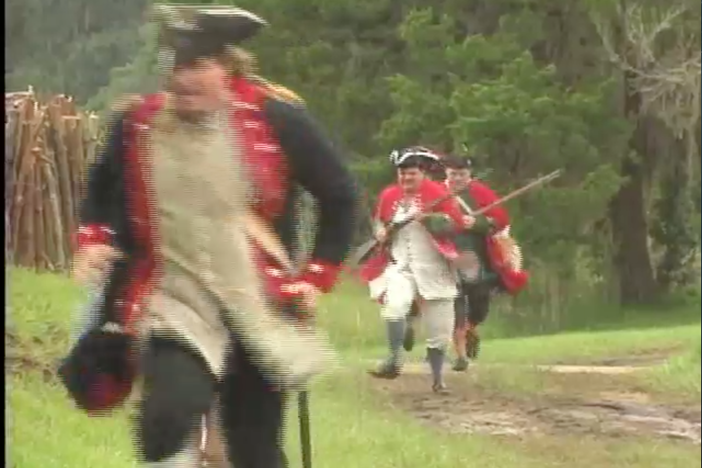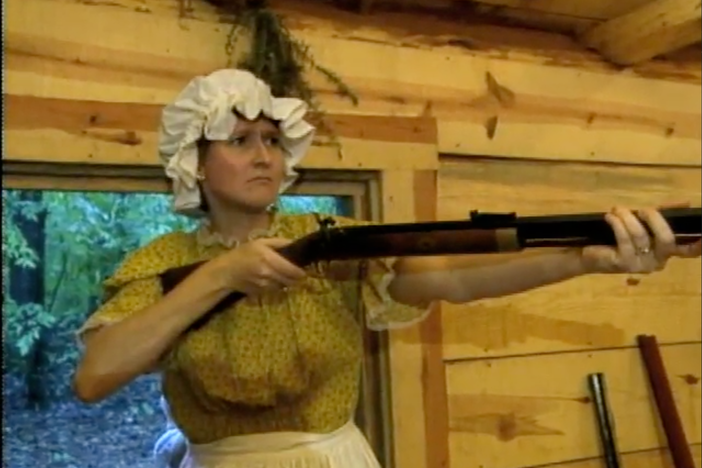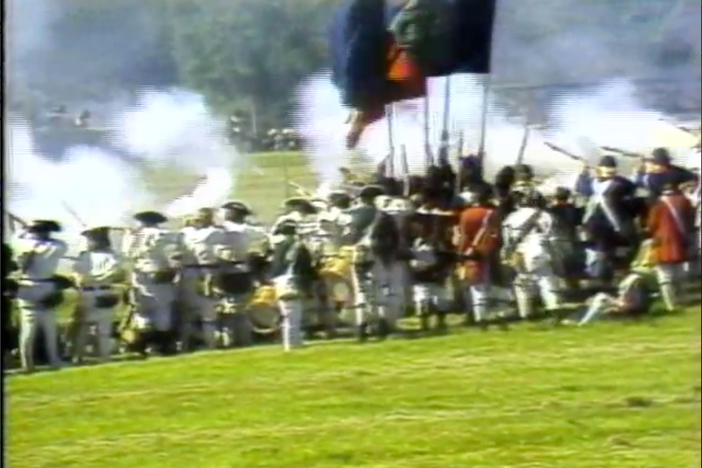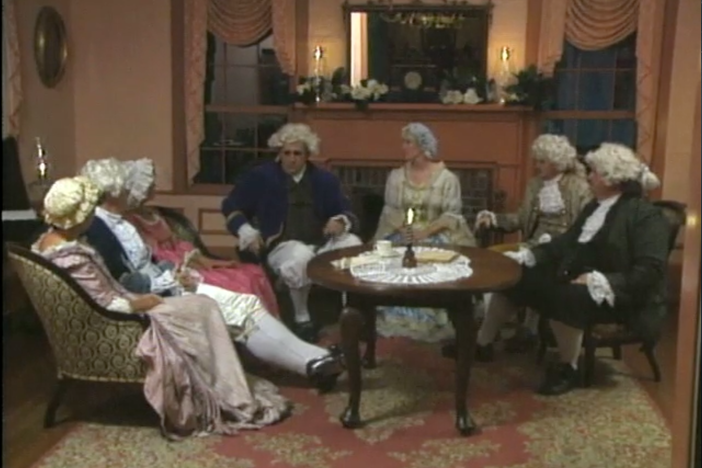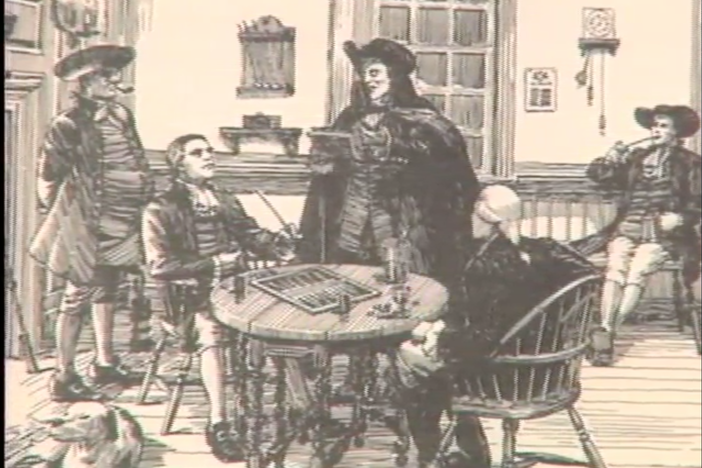The Big Question: To Join or Not to Join?
Using Stately Oaks mansion in Jonesboro as a setting, a group of men and women recreate a typical after-dinner discussion on whether or not the colony of Georgia should take sides in the impending fight to separate from Great Britain.
The Big Question: To Join or Not to Join?
Using Stately Oaks mansion in Jonesboro as a setting, a group of men and women recreate a typical after-dinner discussion on whether or not the colony of Georgia should take sides in the impending fight to separate from Great Britain.
Social Studies
Explain the causes of the American Revolution as they impacted Georgia; include the French and Indian War, Proclamation of 1763, and the Stamp Act.
1. Choose 3 different acts imposed by the British government on the colonists and explain why colonists were opposed to them even though they were British subjects.
2. Why was Georgia one of the last to join in rebelling against British rule?
3. As the young colony of Georgia began to deal with the problem of revolting against Great Britain, the people were divided into three distinct groups. Explain the political views of each of these three groups and why they felt this way.
1. After watching and hearing the discussion, try to identify the position of each of the dinner guests. Who would remain loyal to the king, and who would fight for freedom and a new country? Record the reasons each person gives that are clues to his or her position.
Parliament: the legislative body of England consisting of a House of Commons and a House of Lords
Liberty Boys: a group of colonists who rebelled against British taxation without representation in Parliament; also known as the Sons of Liberty, begun by Samuel Adams in Boston
hothead: one who gets really angry or agitated very quickly and easily
1. Choose 3 different acts imposed by the British government on the colonists and explain why colonists were opposed to them even though they were British subjects.
Some acts may include: The Navigation Act – could only trade with Britain or the other colonies; Sugar Act – colonists could only buy sugar from the West Indies (British colonies); Quartering Act – colonists were forced to provide housing, food, and supplies for British troops; Stamp Act – all legal and commercial documents had to carry an official stamp indicating the tax on it had been paid (This act was never imposed in Georgia.); Townshend Act – imposed a tax on all goods imported into the colonies. The colonists generally did not like being taxed without having their own representative in Parliament. They felt their rights as British citizens were being abused and restricted for the benefit of the British back in England.
2. Why was Georgia one of the last to join in rebelling against British rule?
Georgia was the youngest of the 13 original colonies. They still needed help (financial and governmental) from England. They needed the goods they could import from England, since they were not as industrialized as the northern colonies, and they needed a trading partner. Georgia’s Gov. Wright was very popular, and many of the rich had made their money while he was governor. (Of course, Gov. Wright had gotten rich owning land in Georgia.) Some of the people of Georgia did not like being rebellious (Liberty Boys) and thought they could just talk to Parliament and get the disputes resolved.
3. As the young colony of Georgia began to deal with the problem of revolting against Great Britain, the people were divided into three distinct groups. Explain the political views of each of these three groups and why they felt this way.
Georgia was the youngest of the British colonies. At the time of the signing of the Declaration of Independence, Georgia was only 44 years old. By contrast, Massachusetts had been a colony since 1607, more than 100 years before Georgia was even begun. The idea of governing themselves was a new concept to Georgians. The other colonies had self-government for quite some time. Georgia did not even have its first constitution until 1777. It was still a Royal Colony and had a very popular Royal Governor, James Wright. Trade with Great Britain was important to Georgia to develop and expand its economy. Mercantilism benefited both Georgia and England. In addition, British troops supplied needed protection for this new colony that was very near the border with the Spanish colony of La Florida and threatened by the Indians there, also. Governor Wright had expanded Georgia’s boundaries by seeking treaties from the nearby Indian tribes in the west and north of the colony. White settlers were able to develop large plots of land using slaves and equipment bought within the colonies or from England. They were becoming wealthy and liked the free lifestyle. It was the taxes from Parliament that brought discontent among the colonists. The first generation settlers felt more loyalty to England than their sons. They knew how much England had supported them in their early formative years. They stayed loyal to the King throughout the Revolution. In addition, they had added large plots of land and were quite wealthy. (Gov. Wright had also become wealthy with his land investments in Georgia.) This group was known as the Loyalists or Tories.
The sons of these original settlers were not as loyal to the mother country and only saw England as a barrier to their full enjoyment of freedom. They saw taxes upon taxes as a burden, especially since they were not being directly represented in Parliament. A group called the Liberty Boys was formed from these young men. They were a part of the Sons of Liberty formed in Massachusetts by Samuel Adams. The people of this group that wanted to break from England were called Whigs or Patriots.
A third group of people, approximately one-third of the population of the colony, actually supported the King and Parliament. They owned a lot of land and were wealthy enough to pay the taxes. In order to keep their land, they simply remained silent about their loyalties to the Crown. (Some Tories who left the colony and went to other colonies or back to England had their lands confiscated by the Patriots. Most never returned.)
